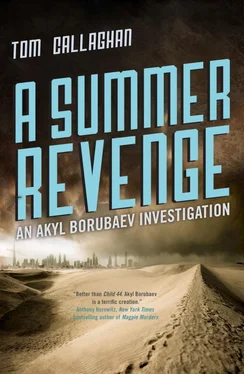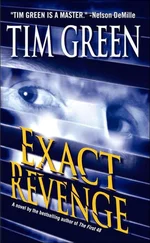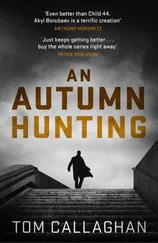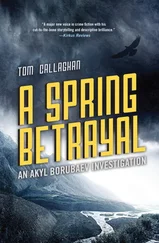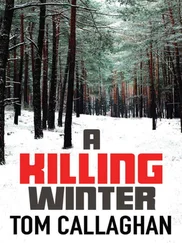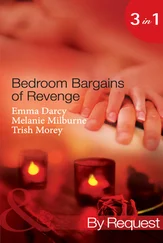I could think of nothing to say, so I said nothing.
We stood there in awkward silence for a few moments while the tannoy system boomed out incomprehensible Arabic. Then Saltanat spoke.
“You’d better take this,” she said, pushing the gun into my hand. I looked at her, not sure why she’d done that until it dawned on me that she didn’t want to carry a piece through the scanners. She was leaving.
“I’d better go, or I’ll miss my flight. I’ve already checked in.”
She started to walk away, and I still couldn’t tell her I loved her. “Business class?” I called out after her. She turned and gave me one of her rare smiles.
“Of course; I’ll have a glass of champagne for you.”
A couple of paces later, she turned again. “I believe you, Akyl, about the photos. Honestly.”
I felt a stab of delight.
“But it doesn’t make any difference.”
And the stab turned into despair, burning more than the wounds on my back.
She didn’t look back again either.
I broke the gun down, wiped it clean on my shirt and disposed of the pieces in various bins on my way to the taxi rank. Throughout the journey back to my hotel I brooded on Saltanat’s dismissal, on the way I felt both women had used and then discarded me. I knew it was partly pride that drove my anger, but I also knew that Natasha was right when she’d said I let my emotions overwhelm my abilities as a detective. Maybe going back into the force wasn’t such a good idea after all.
Throwing my few clothes back into my bag, I checked out. The bill devoured almost all of what was left of my money, leaving just enough for a taxi to the airport and maybe a coffee before I flew. I had a few hours to kill, and I hated airports even more than usual at that point, so I sat in the hotel bar, in a dark corner, away from anyone else stupid enough to make small talk with me.
I thought about calling Tynaliev with the not-so-great news, saw that it was 1 a.m. in Bishkek and decided that waking him would not be a career-enhancing move. After all, the news wasn’t going to be any worse in the morning. Back home, shower, sleep for a couple of hours and then get ready to face the firing squad.
Did I have to go back and face the minister’s anger? Perhaps not, but I was almost out of money, with no place to hide. I’d rather die and be buried in the hilltop cemetery next to Chinara, where we could look at the mountains, hear the wind rushing through the valley below and watch the kites spiraling on the thermals, hunting their prey. Perhaps that’s the only place where I can ever find peace.
But if there’s one thing I’ve learned, it’s that while you can avenge the dead, you can never join them. We’re born alone, then cling together in the dark until we sleep, dreamless and alone. And to give up on life is the ultimate crime, no matter what it hurls at us. Because while the people that concern me have no say in their deaths and die in pain, terror, despair, there are more ways to kill yourself than knife or rope or gun. And I’ve brooded over all of them.
It was while I was musing on these cheerful thoughts that I heard my phone give its usual irritating buzz. I didn’t recognize the number, so I knew it had to be trouble. I had no friends in Dubai; in fact, I probably had no friends at all.
“Yes?”
“My flight leaves in a few minutes.”
Saltanat. I tried to keep my voice calm and professional. That’s how much of a coward I can be. “Have a safe journey. How was the champagne?”
“Excellent. I wish you could have joined me.”
“Well you had something to celebrate,” I said.
“And you?”
I wasn’t sure, but I wondered if there was a hint of concern, some emotion in her voice. I couldn’t help leaping at the idea, a falling climber lunging for a crevice in the rock face. “Well, Tynaliev isn’t going to be happy. And when he’s not delighted, people have a habit of disappearing.”
There was a pause, and I heard the chink of a glass.
“Then why go back?”
I looked around the bar, which was almost empty, at the rows of ludicrously expensive bottles, at the overstuffed chairs, the decor that had never been touched by any sense of style or elegance or restraint. And then I spoke the simple truth, harsh and inevitable.
“Because I’ve nowhere else to go.”
The silence that lay between us felt smothering as I waited for her to speak, to say what I half-hoped, half-dreaded to hear.
“Why not come and—”
“Live in Tashkent?” I interrupted, sounding more terse than I had intended. “I don’t think so, although I’m sure your government would welcome me with open arms.” Which is more than my own will, I didn’t bother to add.
“I’m not suggesting we live together,” Saltanat said, her voice resuming its usual dispassionate tone, “but I’d prefer you alive, rather than buried under a mound of rocks in the Tien Shan.”
“What about letting Natasha shoot me back at the hotel? I didn’t sense much compassion and care for my well-being then.”
“There wasn’t anything I could do in that situation,” she said as if patiently explaining to a slow-witted child, “but I knew Natasha would head for the airport.”
I knew Saltanat was right. Melodramatic gestures are strictly for amateurs, and she hadn’t been one of those since she learned to walk. But knowing she was right didn’t make me feel any better. The pain from the wounds in my back was evidence of that.
“I was surprised you let her go,” Saltanat said. “Your white knight act again. I’ve told you, one day it will get you killed. Today it almost did.”
“That’s easy for you to say. I was trained to bring justice to the dead. You were trained to create them.”
“Better your life than hers, you mean?”
There was an underlying truth there that I didn’t want to explore, so I said nothing. When you feel you have very little to live for, to rejoice in, a future in which to believe, the difference between life and death is paper-thin, fragile and blown away by the first breeze.
“I understand wanting to lay down your life for your friends,” Saltanat said. “But for a hard-faced thieving bitch who dazzles every man with her plastic chest into doing what she wants?”
A man and a woman walked hand in hand toward a table at the back of the bar; I wondered why there was never anyone to hold my hand.
“Either no one counts, or everyone counts,” I said and wondered at the self-righteousness in my voice. Fine words, but I wasn’t at all sure I could live up to them, wondered if in fact I ever had.
“You need to sleep, Akyl,” Saltanat said, and the pity with which she spoke almost unmanned me. “Push all this away until the morning, then flush it out of your life.”
I couldn’t help wondering if her voice held a degree of contempt for me.
A sudden craving for a drink deluged my brain, raging like water brought to the boil or racing down a storm drain after a downpour. I could feel the ice against my teeth, the bite of the lemon mixed with the stab of vodka as brutally cold as if it had lain buried in a snowdrift all winter. The great thing about vodka, perhaps the only thing, is there’s no reason to drink it except to get drunk. No pleasant bouquet, no lingering aftertaste, no harmonizing a decent vintage with a good steak. Cheap, effective and everywhere. But if I’d hadn’t stopped drinking after I’d killed my wife, I’d have drunk myself into the ground next to her.
I realized that Saltanat was speaking, and I dragged myself out of my reverie, shook my head to clear the cobwebs.
“What about money?” she asked. “You need some?”
I started to laugh, hysteria grabbing me by the balls. For at least two minutes I couldn’t help myself, and finally just resigned myself to choking. When I managed to control my laughter, I could hear Saltanat asking what was the matter, what was so funny.
Читать дальше
